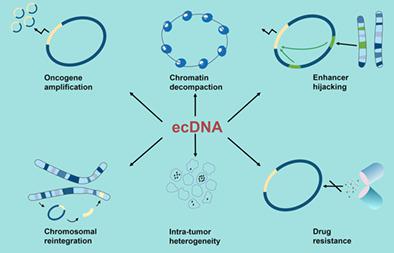当前位置:
X-MOL 学术
›
Clin. Genet.
›
论文详情
Our official English website, www.x-mol.net, welcomes your feedback! (Note: you will need to create a separate account there.)
Progress on the role of extrachromosomal DNA in tumor pathogenesis and evolution
Clinical Genetics ( IF 3.5 ) Pub Date : 2020-12-13 , DOI: 10.1111/cge.13896 Jichen Xing 1, 2 , Qian Ning 2 , Diya Tang 3 , Zhongcheng Mo 4 , Xiaoyong Lei 1 , Shengsong Tang 1, 2
Clinical Genetics ( IF 3.5 ) Pub Date : 2020-12-13 , DOI: 10.1111/cge.13896 Jichen Xing 1, 2 , Qian Ning 2 , Diya Tang 3 , Zhongcheng Mo 4 , Xiaoyong Lei 1 , Shengsong Tang 1, 2
Affiliation

|
The amplification of oncogenes on extrachromosomal DNA (ecDNA) provides a new mechanism for cancer cells to adapt to the changes in the tumor microenvironment and accelerate tumor evolution. These extrachromosomal elements contain oncogenes, and their chromatin structures are more open than linear chromosomes and therefore have stronger oncogene transcriptional activity. ecDNA always contains enhancer elements, and genes on ecDNA can be reintegrated into the linear genome to regulate the selective expression of genes. ecDNA lacks centromeres, and the inheritance from the parent cell to the daughter cell is uneven. This non‐Mendelian genetic mechanism results in the increase of tumor heterogeneity with daughter cells that can gain a competitive advantage through a large number of copies of oncogenes. ecDNA promotes tumor invasiveness and provides a mechanism for drug resistance associated with poorer survival outcomes. Recent studies have demonstrated that the overall proportion of ecDNA in tumors is approximately 40%. In this review, we summarize the current knowledge of ecDNA in the field of tumorigenesis and development.
中文翻译:

染色体外DNA在肿瘤发病机制和进化中的作用研究进展
癌基因在染色体外DNA(ecDNA)上的扩增为癌细胞适应肿瘤微环境变化、加速肿瘤进化提供了新的机制。这些染色体外元件含有癌基因,其染色质结构比线性染色体更开放,因此具有更强的癌基因转录活性。ecDNA总是含有增强子元件,ecDNA上的基因可以重新整合到线性基因组中,调节基因的选择性表达。ecDNA缺乏着丝粒,从亲代细胞到子代细胞的遗传不均。这种非孟德尔遗传机制导致肿瘤异质性增加,子细胞可以通过大量癌基因拷贝获得竞争优势。ecDNA 促进肿瘤侵袭性并提供与较差生存结果相关的耐药机制。最近的研究表明,肿瘤中ecDNA的总比例约为40%。在这篇综述中,我们总结了当前 ecDNA 在肿瘤发生和发展领域的知识。
更新日期:2020-12-13
中文翻译:

染色体外DNA在肿瘤发病机制和进化中的作用研究进展
癌基因在染色体外DNA(ecDNA)上的扩增为癌细胞适应肿瘤微环境变化、加速肿瘤进化提供了新的机制。这些染色体外元件含有癌基因,其染色质结构比线性染色体更开放,因此具有更强的癌基因转录活性。ecDNA总是含有增强子元件,ecDNA上的基因可以重新整合到线性基因组中,调节基因的选择性表达。ecDNA缺乏着丝粒,从亲代细胞到子代细胞的遗传不均。这种非孟德尔遗传机制导致肿瘤异质性增加,子细胞可以通过大量癌基因拷贝获得竞争优势。ecDNA 促进肿瘤侵袭性并提供与较差生存结果相关的耐药机制。最近的研究表明,肿瘤中ecDNA的总比例约为40%。在这篇综述中,我们总结了当前 ecDNA 在肿瘤发生和发展领域的知识。


























 京公网安备 11010802027423号
京公网安备 11010802027423号